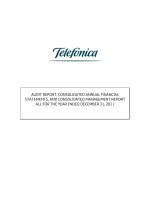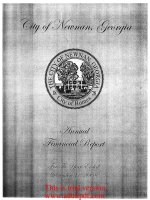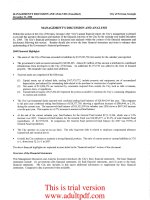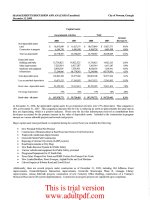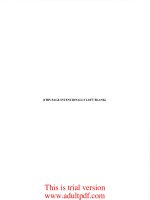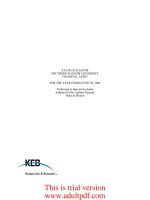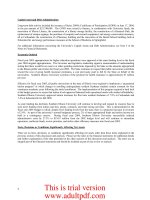NESHOBA COUNTY Combined Statement of Revenues, Expenditures and Changes in Fund Balances All Governmental Fund Types For the Year Ended September 30, 1997_part3 potx
Bạn đang xem bản rút gọn của tài liệu. Xem và tải ngay bản đầy đủ của tài liệu tại đây (95.61 KB, 10 trang )
30
NESHOBA COUNTY
(This page left blank intentionally)
31
OFFICE OF THE STATE AUDITOR
PHIL BRYANT
AUDITOR
INDEPENDENT AUDITOR'S REPORT ON COMPLIANCE AND ON INTERNAL CONTROL OVER
FINANCIAL REPORTING BASED ON AN AUDIT OF THE
PRIMARY GOVERNMENT FINANCIAL STATEMENTS
PERFORMED IN ACCORDANCE WITH GOVERNMENT AUDITING STANDARDS
January 20, 1998
Members of the Board of Supervisors
Neshoba County, Mississippi
We have audited the primary government financial statements of Neshoba County, Mississippi, as of and for
the year ended September 30, 1997, and have issued our report thereon dated January 20, 1998. As referred to in the
Independent Auditor’s Report on the primary government financial statements, we did not audit the financial statements
of the Proprietary Fund Type. Those financial statements were audited by other auditors whose report has been
furnished to us, and our opinion on the primary government financial statements, insofar as it relates to the amounts
included for the Proprietary Fund Type, is based on the report of the other auditors. The auditor's report on the primary
government financial statements is qualified because the primary government financial statements do not include the
financial data of the county's component units, which should be included in conformity with generally accepted
accounting principles. We conducted our audit in accordance with generally accepted auditing standards and the
standards applicable to financial audits contained in Government Auditing Standards , issued by the Comptroller
General of the United States.
Compliance
As part of obtaining reasonable assurance about whether Neshoba County, Mississippi's financial statements
are free of material misstatement, we performed tests of its compliance with certain provisions of laws, regulations,
contracts and grants, noncompliance with which could have a direct and material effect on the determination of financial
statement amounts. However, providing an opinion on compliance with those provisions was not an objective of our
audit and, accordingly, we do not express such an opinion. The results of our tests disclosed no instances of
noncompliance that are required to be reported under Government Auditing Standards .
32
Internal Control Over Financial Reporting
In planning and performing our audit, we considered Neshoba County, Mississippi's internal control over
financial reporting in order to determine our auditing procedures for the purpose of expressing our opinion on the
primary government financial statements and not to provide assurance on the internal control over financial reporting.
Our consideration of the internal control over financial reporting would not necessarily disclose all matters in the internal
control over financial reporting that might be material weaknesses. A material weakness is a condition in which the
design or operation of one or more of the internal control components does not reduce to a relatively low level the risk
that misstatements in amounts that would be material in relation to the financial statements being audited may occur and
not be detected within a timely period by employees in the normal course of performing their assigned functions. We
noted no matters involving the internal control over financial reporting and its operation that we consider to be material
weaknesses.
This report is intended for the information of management. However, this report is a matter of public record
and its distribution is not limited.
PHIL BRYANT RAMONA HILL, CPA
State Auditor Director, Financial and Compliance Audit Division
33
OFFICE OF THE STATE AUDITOR
PHIL BRYANT
AUDITOR
INDEPENDENT AUDITOR'S REPORT ON CENTRAL PURCHASING SYSTEM,
INVENTORY CONTROL SYSTEM AND PURCHASE CLERK SCHEDULES
(REQUIRED BY SECTION 31-7-115, MISS. CODE ANN. (1972))
January 20, 1998
Members of the Board of Supervisors
Neshoba County, Mississippi
We have made a study and evaluation of the central purchasing system and inventory control system of
Neshoba County, Mississippi, as of and for the year ended September 30, 1997. Our study and evaluation included tests
of compliance of the Purchase Clerk records and such other auditing procedures as we considered necessary in the
circumstances.
The Board of Supervisors of Neshoba County, Mississippi, is responsible for establishing and maintaining a
central purchasing system and inventory control system in accordance with Sections 31-7-101 through 31-7-127, Miss.
Code Ann. (1972). In addition, the Board of Supervisors is responsible for purchasing in accordance with the bid
requirements of Section 31-7-13, Miss. Code Ann. (1972). The Board of Supervisors of Neshoba County, Mississippi,
has established centralized purchasing for all funds of the county and has established an inventory control system. The
objective of the central purchasing system is to provide reasonable, but not absolute, assurance that purchases are
executed in accordance with state law.
Because of inherent limitations in any central purchasing system and inventory control system, errors or
irregularities may occur and not be detected. Also, projection of any evaluation of the system to future periods is subject
to the risk that procedures may become inadequate because of changes in conditions or that the degree of compliance
with the procedures may deteriorate.
In our opinion, Neshoba County, Mississippi, complied, in all material respects, with state laws governing
central purchasing, inventory and bid requirements.
The accompanying schedules of (1) purchases not made from the lowest bidder, (2) emergency purchases and
(3) purchases made noncompetitively from a sole source are presented in accordance with Section 31-7-115, Miss.
Code Ann. (1972). The information contained on these schedules has been subjected to procedures performed in
connection with our aforementioned study and evaluation of the purchasing system and, in our opinion, is fairly
presented when considered in relation to that study and evaluation.
34
This report is intended for use in evaluating the central purchasing system and inventory control system of
Neshoba County, Mississippi, and should not be relied upon for any other purpose. This is not intended to limit the
distribution of the report, which is a matter of public record.
PHIL BRYANT RAMONA HILL, CPA
State Auditor Director, Financial and Compliance Audit Division
35
NESHOBA COUNTY Schedule 1
Schedule of Purchases Made From Other Than the Lowest Bidder
For the Year Ended September 30, 1997
Our test results did not identify any purchases from other than the lowest bidder.
36
NESHOBA COUNTY Schedule 2
Schedule of Emergency Purchases
For the Year Ended September 30, 1997
Our test results did not identify any emergency purchases.
37
NESHOBA COUNTY Schedule 3
Schedule of Purchases Made Noncompetitively From a Sole Source
For the Year Ended September 30, 1997
Our test results did not identify any purchases made noncompetitively from a sole source.
38
NESHOBA COUNTY
(This page left blank intentionally)
39
OFFICE OF THE STATE AUDITOR
PHIL BRYANT
AUDITOR
INDEPENDENT AUDITOR'S REPORT ON COMPLIANCE WITH STATE
LAWS AND REGULATIONS
January 20, 1998
Members of the Board of Supervisors
Neshoba County, Mississippi
We have audited the primary government financial statements of Neshoba County, Mississippi, as of and for
the year ended September 30, 1997, and have issued our report thereon dated January 20, 1998. As referred to in the
Independent Auditor’s Report on the primary government financial statements, we did not audit the financial statements
of the Proprietary Fund Type. Those financial statements were audited by other auditors whose report has been
furnished to us, and our opinion on the primary government financial statements, insofar as it relates to the amounts
included for the Proprietary Fund Type, is based on the report of the other auditors.
The auditor's report on the primary government financial statements is qualified because the primary government
financial statements do not include the financial data of the county's component units, which should be included in
conformity with generally accepted accounting principles. We conducted our audit in accordance with generally
accepted auditing standards and the procedures prescribed by the State Auditor, and accordingly, included such tests of
the accounting records and such other auditing procedures as we considered necessary in the circumstances.
As required by the state legal compliance audit program prescribed by the Office of the State Auditor, we have
also performed procedures to test compliance with certain state laws and regulations. Our procedures were substantially
less in scope than an audit, the objective of which is the expression of an opinion on the county's compliance with these
requirements. Accordingly, we do not express such an opinion.
With respect to the items tested, the results of those procedures and our audit of the primary government
financial statements disclosed no instances of noncompliance with state laws and regulations.
This report is intended for the information of management. This is not intended to limit the distribution of this
report, which is a matter of public record.
PHIL BRYANT RAMONA HILL, CPA
State Auditor Director, Financial and Compliance Audit Division
